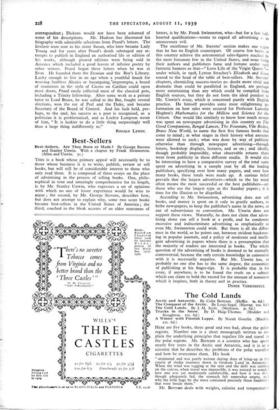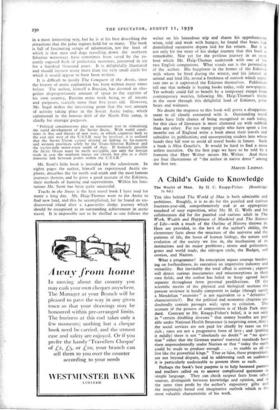The Cold Lands
Stoughton. zos. 6d.)
HERE are five books, three good and two bad, about the polar regions. Number one is a short monograph written to ex- plain the underlying principles that regulate life and travel in the polar regions. Mr. Bertram is a scientist who has spent nearly five years in the Arctic and Antarctic, and it is as a scientist that he describes thz. problems of the polar traveller and how he overcomes them. His book "originated and was partly written during days of lying-up in the course of sledge journeys down in Graham Land in Antarctica. When the wind was tugging at the tent and the drift was rattlin4 on the canvas, when travel was impossible, it was natural to wonder how one was yet moderately comfortable, and how it was dri!, though adequately fed, the stomach felt somewhat empty, ani why the little bags by the stove contained precisely those foodstuffs that were Inside them."
Mr. Bertram deals with weights, calories and temperatures in a most interesting way, but he is at his best describing the attractions that the polar regions hold for so many. The book is full of fascinating scraps of information, not the least of which is that men and dogs travelling down the northern Siberian waterways have sometimes been saved by the re- cently exposed flesh of prehistoric monsters, preserved in ice for a hundred thousand years. It is delightfully illustrated and should interest many more than the very small circle for which it would appear to have been written.
It is difficult to justify The Conquest of the Arctic, since the history of arctic exploration has been written many times before. The author, himself a Russian, has devoted an alto- gether disproportionate amount of space to the exploits of his own country, Russian arctic work being, to all intents and purposes, scarcely more than five years old. However, Mr. Segal makes the interesting point that the vast amount of activity taking place in the Soviet Arctic today, which culminated in the famous drift of the North Pole camp, is chiefly for strategic purposes.
"Political considerations play an imoortant part in stimulating the rapid development of the Soviet Arctic. With world condi- tions in flux and threats of new wars, in which countries both to the east and west of the U.S.S.R. may be involved, it is realised that the Soviet Union cannot depend on linking its far-eastern and western provinces solely by the Trans-Siberian Railway and the z 2,7oo-mile water-route south of Asia. If humanly possible the Arctic Ocean must be made navigable not only for foreign trade in case the southern routes are closed, but also as a short domestic link between points within the U.S.S.R."
Mr. Scott's little book is intended for the schoolroom. In eighty pages the author, himself an experienced Arctic ex- plorer, describes the far north and south and the most famous journeys thereto, and he gives a good account of the Eskimos, their methods of hunting and superstitions. Within his limi- tations Mr. Scott has been quite successful.
Tracks in the Snow is the best travel book I have read for many a long day. Mr. Haig-Thomas went to the Arctic to find new land, and this he accomplished, for he found an un- discovered island after a r,400-miles sledge journey which should be recognised as an outstanding achievement in arctic travel. It is impossible not to be thrilled as one follows the writer on his hazardous trip and shares his apprehensions when, cold and weak with hunger, he found that bears had demolished successive depots laid for his return. But it is not only for the story of his sledge journey that this book is remarkable. Nor yet for the perilous journey in an open boat which Mr. Haig-Thomas undertook with one of his two English companions. What stands out is the personality of the author. His happiness in the homes of the Eskimos with whom he lived during the winter, and his interest in animal and bird life, reveal a freshness of outlook which capti- vate one as it captivated the Eskimos themselves. Publishers tell one that nobody is buying books today, only newspapers. Yet nobody could fail to benefit by a temporary escape from contemporary worries, following Mr. Haig-Thomas's tracks in the snow through this delightful land of Eskimos, polar bears and walruses.
No doubt the response to this book will prove a disappoint- ment to all closely connected with it. Outstanding travel books have little chance of being recognised as such today, for this class of literature is more cluttered up with rubbish than any other. Far too many people who have spent a few months out of England write a book about their travels and subsidise its publication; and unsuspecting readers into whose hands they fall vow to avoid all travel books in future. Such a book is Miss Gourlie's. It would be hard to find a more artless narrative. On the first page we have to be told by a footnote that Herr Wolter means Mr. Wolter. And there are four illustrations of "the author in native dress" among the first ten.
MARTIN LINDSAY.









































 Previous page
Previous page